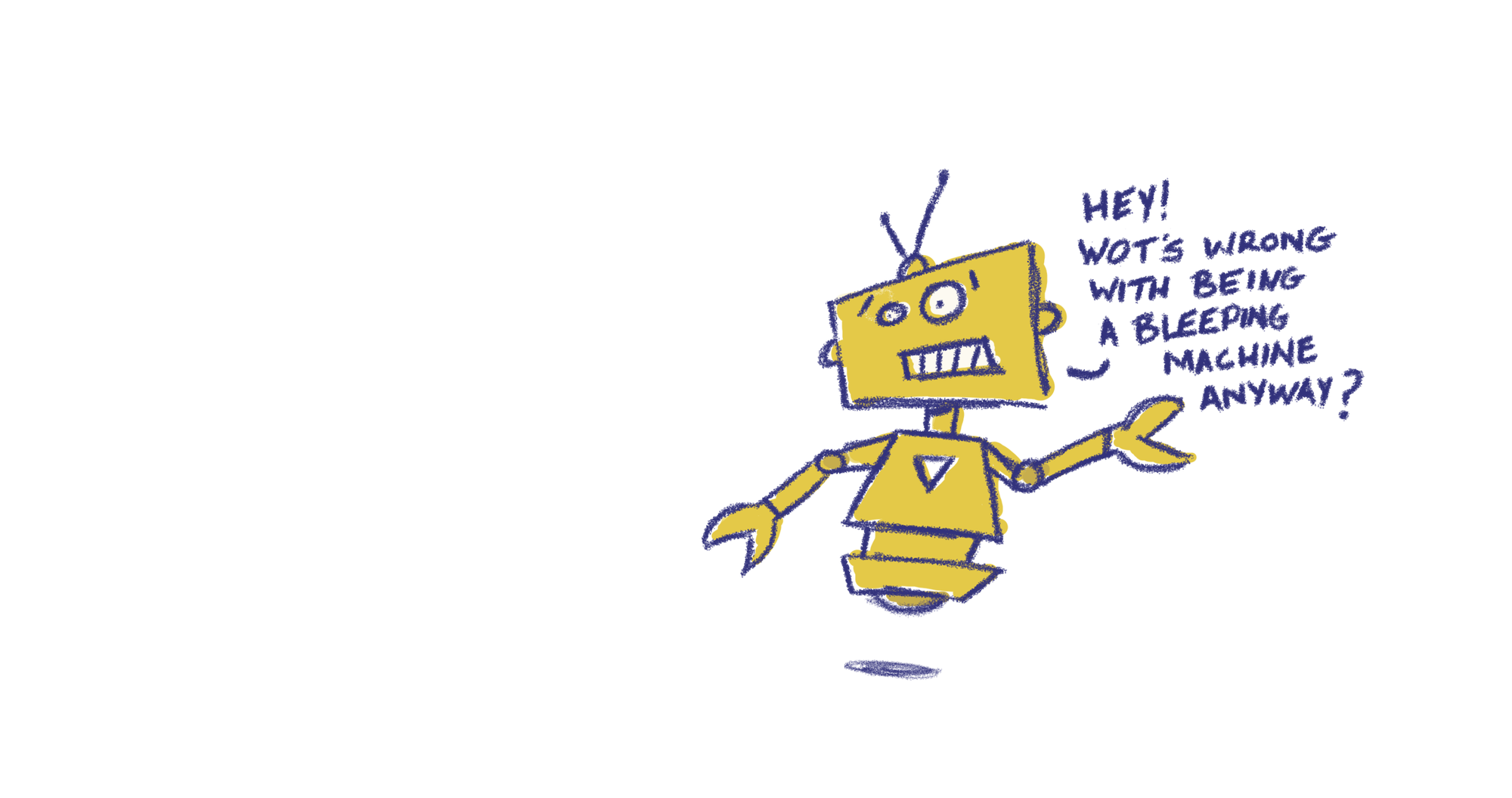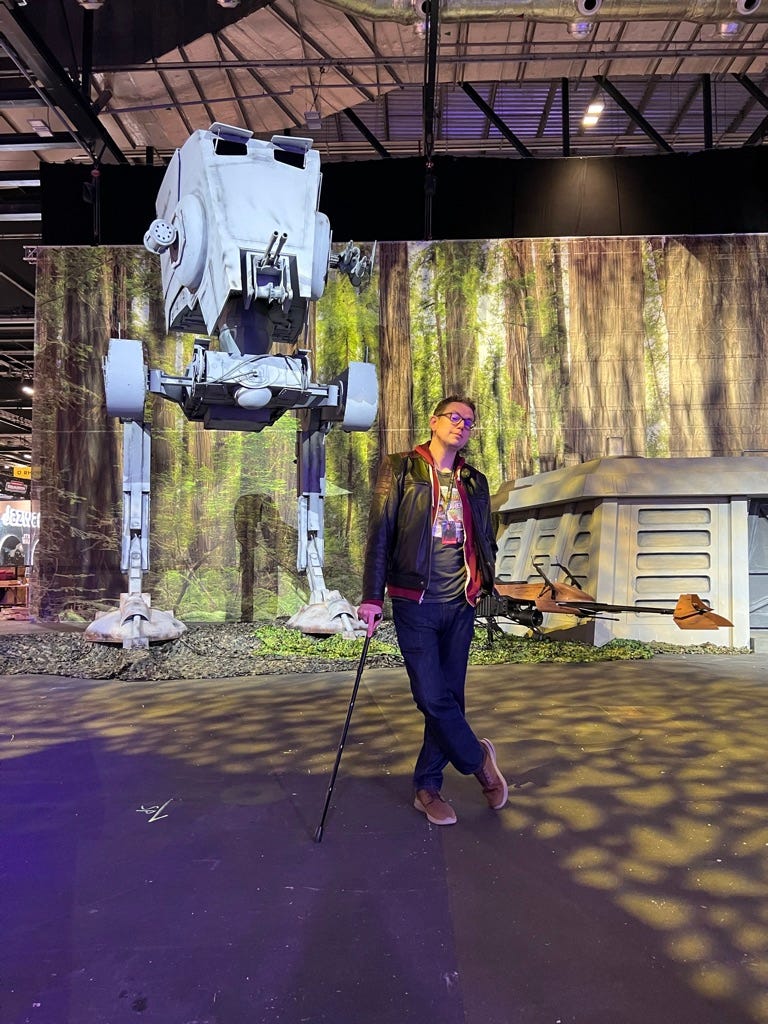Why I don't want to be a machine anymore
Remembering to be human in a world obsessed with excessive busyness

In Disconnected, journalist Emma Gannon writes:
“In the lead-up to writing this book I had quite a lot on, and a few people around me commented ‘You’re a machine!’ They meant it as a compliment, they were being nice – but it triggered me. I don’t want to be a machine, I want to be a human, and I don’t want to be praised for how much I can ‘pump out’.”
I’ve been told the same thing in the past, accepting the compliment as a badge of honour.
“You’re the busiest man, I know.”
“Don’t you ever sleep?”
“You’re always working,”
As time passed, like Emma, I started to wonder… is being a machine such a good thing? Is it really something I should strive for? Is it a compliment at all?

“He’s more machine now than man.”
That’s Obi-Wan Kenobi talking about Darth Vader in Return of the Jedi, and it’s definitely not a compliment. In fact, Ben immediately adds “twisted and evil” to hammer home his point. But leaving aside being a Dark Lord of the Sith, the first part of Obi-Wan’s sentiment stands. Being more machine than human is something to pity, and I was wearing the same epithet as a gold star!
Now, I’m not saying there is anything wrong with hard work. I’ve worked hard all my freelance career. And I’ve shouted about it at every possibility. Probably too much.
Look at how much I’m doing! Look how many words I’ve written today! Yes, I am a machine. Watch me churn!
Then two things happened last year, events that changed everything.
First, I burned out. It was when I was writing my latest novel, Star Wars: The High Republic - Path of Vengeance. Around my birthday, I hit rock bottom, my mental state unravelling. I had exhausted myself physically and emotionally and ended up in a terrible place. After one particularly brutal panic attack, my wife got me out of the house. We talked about how I was feeling and a decision was made. I would try therapy, something I’d always resisted, believing it was a sign of weakness.
The weakness, it turned out, was not admitting I needed help.
There were several reasons for my state, but by far the largest was the pressure I was putting myself under. To be constantly on. To appear successful. To work, work, work, WORK!
Then came Covid. I caught everyone’s least favourite virus while on vacation in America and it knocked me for six. Talk about being forced to relax!
Unfortunately, it also had a lasting effect.
I have a condition called HNPP, or Hereditary Neuropathy with liability to Pressure Palsies. It’s an invisible illness, which means my nerves are highly susceptible to damage, leading to prolonged numbness at one end of the scale or extreme pain and paralysis at the other. It can affect my ability to walk and lead to chronic fatigue. I was diagnosed a few years ago but, other than the odd flare-up now and then, had firmly filed it away as something for Future Cav to worry about.
Covid, it appears, has sped up the process.
It means I’ve had to make some changes to the way I live. The outward sign is that I sometimes use a stick to help me walk, especially when my legs feel like lead, or my balance is a bit iffy.
(The flip side is that I can use it as a natty prop when posing for photos…)

Then, there are the changes I’ve had to build into my professional life. I’ve had to stop working every hour of the day and night, planning time off after busy periods and especially after conventions, which I love but have the potential to wipe me out completely.
A case in point was Portsmouth Comic Con a few weekends ago. I had a fantastic time (seriously, it’s a great, great con) but attempted to pile straight back into work the following Monday. Uh-oh. Big mistake. By 2pm, I was forced to rest up for the remainder of the day. And do you know what…it worked! The next morning, I was back up to speed and kicking myself for not taking the time off in the first place.
As a freelancer, there’s a fear of talking about these kinds of things in public. Our business is highly pressurised and ultra-competitive. It’s a hustle. You want to appear strong. Reliable. You want to be seen as busy because being busy attracts work.
There’s a concern that if you’re open about needing time to recharge and recuperate, people will pass over you for future jobs. I’m feeling it even as I type this, a fear that saying this out loud will harm my prospects.
But the reality is that, even with these measures in place, I’m still working on a lot of projects. Still spinning a lot of plates. The difference is that I’m building time around my jobs. Time when I’m not doing anything. Time to recover. To replenish.
It doesn’t always work. What is it they say about the best-laid plans? Projects can suddenly shift without warning, delays, and external pressures meaning that jobs spaced nicely apart suddenly pile on top of each other. But that’s another reason you have to build flexibility into your schedule, to allow you to react to the unexpected.
And that means saying no to projects from time to time, something else largely alien to a freelancer. Something we agonise over. It’s that fear again. If I say no, they may not come back. And, to misquote another Jedi master, fear leads to saying yes. Saying yes leads to over-commitment. Over-commitment leads to overwhelm. Overwhelm leads to burnout.
Fear truly is the path to the dark side.
And here’s the rub. Taking time back, and blocking out time to recharge and recuperate, means that the work I am doing is hopefully better. I come to it with a clearer head. I come to it smarter. And I’m infinitely more honest about what I can do and what I can’t fit into a schedule that is ultimately finite. The old cliche is true: there really are only so many hours of the day.
We need to get better about this. We need to be more transparent as an industry. The culture of busyness — which I know I’ve been guilty of perpetuating —has to stop. We need to ban jokes like ‘what is sleep?’ or the one I hear that really frustrates me, ‘what is a vacation?’ We are humans, not machines. That’s what makes us creative. That’s what gives value to our work.
We need downtime. We need to recharge. We need to listen to our bodies.
I wish I’d listened before I was forced to, but I’m glad it happened because I’m still in the race, more so than ever. I just view it as a marathon now rather than a series of nerve-shedding, never-ending sprints.
And I’m definitely not a machine.

